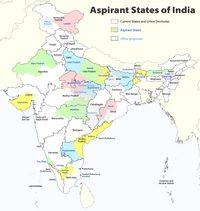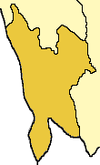| Karbi Anglong Autonomous Council | |
|---|---|
 | |
| Type | |
| Type | Autonomous District Council |
| Leadership | |
| Chief Executive Member | Tuliram Ronghang, BJP |
| Structure | |
| Seats | 26 Members |
 | |
| Political groups |
|
| Elections | |
| Last election | June 2022 |
| Next election | 2027 |
| Meeting place | |
| Diphu, Assam | |
| Website | |
| karbianglong | |
Karbi Anglong Autonomous Council (KAAC) is an autonomous district council in the state of Assam, India for development and protection of tribals living in area namely Karbi Anglong and West Karbi Anglong district. The council is constituted under the Sixth Schedule of the Constitution of India and administratively functions under the Government of Assam. Its headquarters is in Diphu, Karbi Anglong district. The total administrative area of the Council is 10,434 sq. km with a population of 961,275 as of 2011.
History
The Government of India passed a bill in Lok Sabha in the year 1951 and Sri. Rajendra Prasad, His Excellency the President of India assented to the creation of United Mikir and North Cachar Hills District. In 1970, the district of United Mikir and North Cachar Hills district was bifurcated into two separate districts under banner as "Mikir Hills" and "North Cachar Hills" district. In 1976, the Mikir Hill district was again rechristened as "Karbi Anglong District" w.e.f. 14 October 1976 vide Govt. Notification No. TAD/R/115/74/47 Dtd. 14-10-1976. Thus, Karbi Anglong became a full fledged separate district in the Indian state of Assam with its headquarter at Diphu.
It was formed with the name Karbi Anglong District Council on 17 November 1951. Later changed to Karbi Anglong Autonomous Council on 23 June 1952, which is now celebrated as its foundation day. After Signing of M.O.U. between Government of India, Government of Assam and United People's Democratic Solidarity, it was renamed to Karbi Anglong Autonomous Territorial Council. It has administrative functions over two districts, Karbi Anglong district and West Karbi Anglong district.
On 1 April 1996, the Karbi Anglong District Council was renamed as the Karbi Anglong Autonomous Council by an Act of Parliament by incorporating into the Sixth Schedule in the Constitution (Amendment) Act, 1995 (42 of 1995) of the Constitution of India granting greater autonomy to the Council vide Govt. Notification No. HAD.57/95/63-64, dtd. 29.06.1995, and entrusted 30 (thirty) more department to Karbi Anglong Autonomous Council along with other sponsored schemes for the welfare of indigenous people. Further, a tripartite Memorandum of Settlement (MoS) was signed between the Central Government, Government of Assam and United People's Democratic Solidarity (UPDS) in the presence of Union Home Minister Shri P. Chidambaram and Assam Chief Minister Shri Tarun Gogoi in accordance with which the Karbi Anglong Autonomous Council will be re-christened as KARBI ANGLONG AUTONOMOUS TERRITORIAL COUNCIL.
On 15 August 2015, the district was further bifurcated into two districts, namely Karbi Anglong and West Karbi Anglong Districts. As such the purview of the present Karbi Anglong Autonomous Council (KAAC) has jurisdiction over two full fledged districts.
Structure
Executive branch
Heading the Executive Wing of the ADC is the Executive Committee whose duties are similar to those of the Cabinet of the State. The head of the Executive Committee, that is, the Chief Executive Member is elected by majority votes by the Council in Session and such election is to be approved by the Governor of the State. The Chief Executive Member then nominates Members of the Executive Committee from amongst the members of the Council. The Executive Committee remains in Office as long as they enjoy the majority support of Members of the Council.
- List of Chief Executive Members
The list of politicians that served as the CEM of KAAC is given below:
| Sl. No. | Name | From | To |
|---|---|---|---|
| 1 | Sri. Khor Sing Terang | 23 June 1952 | 28 November 1955 |
| 2 | Sri. Nihang Rongphar | 15 December 1955 | 25 June 1956 |
| 3 | Sri. Chatra Sing Teron | 26 June 1956 | 15 September 1957 |
| 4 | Sri. Nihang Rongphar | 25 June 1957 | 2 December 1957 |
| 5 | Sri. Chandra Sing Teron | 3 May 1957 | 25 June 1962 |
| 6 | Sri. Dhaniram Rongpi | 26 June 1962 | 21 March 1971 |
| 7 | Sri. Dhaniram Rongpi | 24 March 1971 | 22 September 1972 |
| 8 | Sri. Joysing Doloi | 12 December 1972 | 04 May 1978 |
| 9 | Sri. Khorsing Bey | 11 May 1978 | 24 September 1979 |
| 10 | Sri. Bidya Sing Engleng | 28 September 1979 | 13 December 1979 |
| 11 | Sri. Bidya Sing Engleng | 18 January 1980 | 2 January 1981 |
| 12 | Sri. Biren Sing Engti | 3 March 1981 | 16 January 1983 |
| 13 | Sri. Bidya Sing Engleng | 26 February 1983 | 27 February 1983 |
| 14 | Sri. Bidya Sing Engleng | 28 January 1984 | 7 August 1985 |
| 15 | Sri. Khor Sing Engti | 9 August 1985 | 11 September 1985 |
| 16 | Sri. Mongal Sing Engti | 15 November 1985 | 26 November 1986 |
| 17 | Sri. Bidya Sing Engleng | 5 December 1986 | 22 January 1989 |
| 18 | Dr. Jayanta Rongpi | 25 January 1989 | 11 June 1996 |
| 19 | Sri. Jotson Bey | 21 June 1996 | 29 July 2000 |
| 20 | Sri. Mojari Hanse | 31 July 2000 | 15 March 2001 |
| 21 | Sri. Khor Sing Engti | 11 January 2002 | 18 March 2002 |
| 22 | Sri. Khor Sing Engti | 19 March 2002 | 17 May 2006 |
| 23 | Sri. Sum Ronghang | 3 June 2006 | 19 January 2007 |
| 24 | Sri. Mongal Sing Engti | 23 January 2007 | 12 January 2009 |
| 25 | Sri. Joy Ram Engleng | 13 January 2009 | 12 January 2012 |
| 26 | Sri. Joy Ram Engleng | 20 January 2012 | 15 October 2013 |
| 27 | Sri. Tuliram Ronghang | 17 October 2013 | 4 July 2017 |
| 28 | Sri. Tuliram Ronghang | 7 July 2017 | 22 June 2022 |
| 29 | Sri. Tuliram Ronghang | 23 June 2022 | Present |
Legislative branch
The Council hold a session quarterly (every four months). The Annual Budget of the Autonomous Disctrict Council has to be passed by majority votes in the session. The other duties of the Council in session are to legislate and enact laws and regulations on such powers as conferred by the Sixth Schedule. Bills on laws and regulations passed by the Council in session are sent to the Governor of the State for his assent or approval.
To run the affairs of the Legislative Secretariat, the Council in session elects a Chairman and Deputy Chairman whose duties are similar to the Speaker and the Deputy Speaker of the State Legislature respectively. The Office of the Legislative is looked after by officers and staff headed by the Secretary Legislative.
Subjects under KAAC
There are 30 subjects under the jurisdiction of Karbi Anglong Autonomous Council. The 30 subjects are listed in the table below:
| Sl. no. | Name of the Subject |
|---|---|
| 1 | Industry |
| 2 | Animal Husbandry and Veterinary |
| 3 | Forest |
| 4 | Agriculture |
| 5 | P.W.D |
| 6 | Sericulture |
| 7 | Education (Primary, higher secondary and adult education) |
| 8 | Cultural affairs |
| 9 | Soil conservation |
| 10 | Co-operation |
| 11 | Fisheries |
| 12 | Panchayat and rural development including DRDA |
| 13 | Handloom and textile |
| 14 | Health and family welfare |
| 15 | Public health engineering |
| 16 | Irrigation |
| 17 | Social welfare |
| 18 | Flood control |
| 19 | Sports and youth welfare |
| 20 | Weights and measures |
| 21 | Food and civil supplies |
| 22 | Town and country planning |
| 23 | College education including library, museum and archaeology |
| 24 | Land reforms |
| 25 | Publicity and public relations |
| 26 | Printing and stationery |
| 27 | Tourism |
| 28 | Transport |
| 29 | Excise |
| 30 | Finance including sales tax, excise and professional tax |
Election
The council held their own election separate from National and State assembly. Elections are held every 5 years.
2022 Elections
BJP swept the election by winning all 26 seat of the Council. Tuliram Ronghang is appointed as Chief Executive of the council.
See also
- Karbi people
- Karbi language
- Karbi Youth Festival
- Autonomous administrative divisions of India
- Hill tribes of Northeast India
- North Eastern Council
References
- "Karbi Anglong Autonomous Council". Government of Assam. Archived from the original on 3 December 2022. Retrieved 21 November 2022.
- "Assam: BJP wins all 26 seats in Karbi Anglong Autonomous Council polls, PM Modi says 'historic mandate'". Indian Express. Retrieved 13 June 2022.
- "KAAC celebrates 67th Foundation Day - Eastern Mirror". 23 June 2018. Archived from the original on 11 August 2019. Retrieved 11 August 2019.
- "Our History | Hill Areas | Government of Assam, India". Archived from the original on 11 August 2019. Retrieved 11 August 2019.
- "The history of Karbi Anglong Autonomous Council". Archived from the original on 30 July 2024. Retrieved 28 May 2024.
- "List of CEMs". Karbi Anglong Autonomous Council. Archived from the original on 30 July 2024. Retrieved 30 July 2024.
- "EMPOWERING AND STRENGTHENING OF PANCHAYATI RAJ INSTITUTIONS/AUTONOMOUS DISTRICT COUNCILS/TRADITIONAL TRIBAL GOVERNING INSTITUTIONS IN NORTH EAST INDIA" (PDF). legalaffairs.gov.in. Archived (PDF) from the original on 6 January 2023. Retrieved 18 February 2024.
- Desk, India com News. "Assam KAAC Elections 2022: BJP Wins All 26 Karbi Anglong Autonomous Council Seats, Congress Draws Blank". www.india.com. Archived from the original on 3 November 2022. Retrieved 3 November 2022.
{{cite web}}:|last=has generic name (help) - "ABOUT KARBI ANGLONG AUTONOMOUS COUNCIL:: | Karbi Anglong District | Government Of Assam, India". karbianglong.gov.in. Archived from the original on 30 July 2024. Retrieved 3 November 2022.
External links
| 6th Schedule areas (Constitution of India) |
| ||||||||
|---|---|---|---|---|---|---|---|---|---|
| Non-6th Schedule areas (State legislation) |
| ||||||||
| Central India |
|  |
|---|---|---|
| East India | ||
| North India |
| |
| Northeast India |
| |
| South India |
| |
| West India |
| |
| Current states and union territories of India | ||
| Lawngtlai District | ||
|---|---|---|
| District Headquarters |  | |
| State | ||
| Autonomous District Councils | ||
| Towns and villages | ||
| Indigenous Tribes | ||
| Peaks | ||
